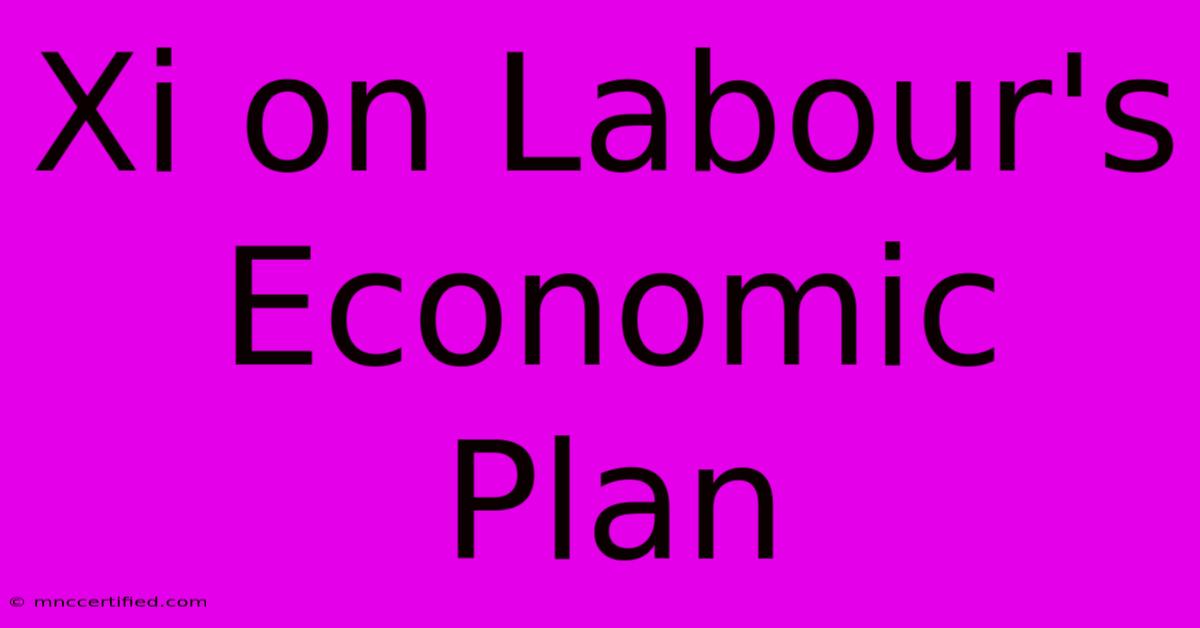Xi On Labour's Economic Plan

Table of Contents
Xi Jinping's Take on Labour's Economic Plan: A Critical Analysis
The recent unveiling of Labour's economic plan has sparked considerable debate, both domestically and internationally. One key perspective often overlooked in the Western media is that of China, and specifically, the views of President Xi Jinping and the Chinese Communist Party (CCP). While we won't have a direct statement from Xi himself on this specific plan, we can analyze the likely CCP response based on their stated economic priorities and historical reactions to similar Western policies. This analysis will explore potential areas of agreement and disagreement, highlighting the geopolitical implications of Labour's proposals.
Understanding Labour's Economic Blueprint
Labour's economic plan generally focuses on several key areas: increased public spending on infrastructure and public services, nationalization or increased regulation of key industries, higher taxes on corporations and high earners, and a stronger emphasis on tackling climate change. These policies are often framed as addressing inequality and boosting economic growth through investment and job creation. However, the specific details and their potential economic impact remain subjects of intense debate among economists. Key terms to understand in this context include public investment, fiscal policy, industrial strategy, and green transition.
Potential Points of Convergence
While the ideologies differ significantly, there might be limited areas where the CCP could find common ground with aspects of Labour's plan. For instance, both emphasize the importance of state-led investment in infrastructure. China's Belt and Road Initiative is a prime example of large-scale state-driven infrastructure projects. Similarly, Labour's focus on green technologies and tackling climate change aligns with China's growing commitment to renewable energy, albeit with different approaches and priorities. The CCP might also acknowledge the need for industrial policy, although their approach would likely differ significantly in terms of the level of state control and the selection of strategic industries.
Areas of Significant Divergence
Despite some superficial similarities, fundamental ideological differences create significant points of divergence between the CCP's economic approach and Labour's proposals. The CCP's economic model, characterized by state capitalism and a strong emphasis on party control, contrasts sharply with Labour's focus on social democracy and market regulation.
Concerns about State Control
The CCP is likely to be highly critical of Labour's proposals for nationalization or increased regulation of key industries. They view such measures as potentially hindering economic efficiency and undermining market mechanisms. The CCP's preference for state-owned enterprises (SOEs) operating within a largely market-driven economy differs significantly from Labour's more interventionist approach.
Taxation and Inequality
Labour's plan to increase taxes on corporations and high earners is another area of likely contention. While the CCP also seeks to address income inequality, their methods often involve targeted social programs and crackdowns on corruption rather than significant tax increases on the private sector. The CCP might view Labour's tax proposals as potentially discouraging investment and hindering economic growth.
Geopolitical Implications
The success or failure of Labour's economic plan has significant implications for global geopolitics. A thriving UK economy under Labour could potentially challenge China's economic influence, especially within the European Union. Conversely, an economically struggling UK under Labour might make it more reliant on China, potentially shifting the balance of power in favour of Beijing.
Conclusion: Xi's Likely Perspective
While we lack a direct statement from Xi Jinping, it's highly probable that the CCP would view Labour's economic plan with a mix of skepticism and cautious observation. While some areas of limited convergence exist, the core ideological differences and potential challenges to China's economic interests are likely to outweigh any points of agreement. The CCP's response will likely involve a careful assessment of the plan's potential impact on global economic stability and the UK's geopolitical role. Further observation and analysis are crucial to fully understand the evolving dynamics between China and the UK under a potential Labour government.

Thank you for visiting our website wich cover about Xi On Labour's Economic Plan. We hope the information provided has been useful to you. Feel free to contact us if you have any questions or need further assistance. See you next time and dont miss to bookmark.
Featured Posts
-
Gaudette Insurance Northbridge Ma
Nov 19, 2024
-
New Mom Jennifer Lawrences Dress
Nov 19, 2024
-
Croatia Vs Portugal Uefa Nations Watch Live
Nov 19, 2024
-
Stakes In The Russia North Korea Pact
Nov 19, 2024
-
Korean Troops Deployed To Kursk
Nov 19, 2024